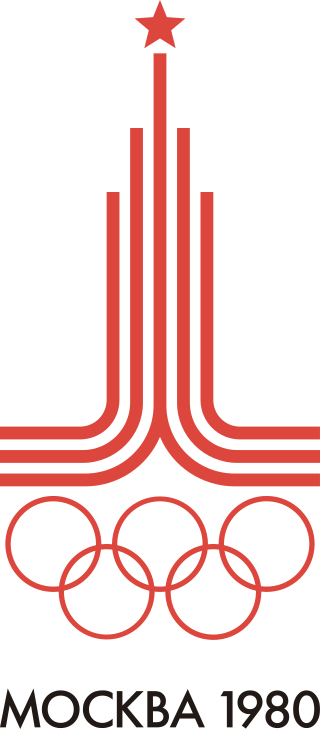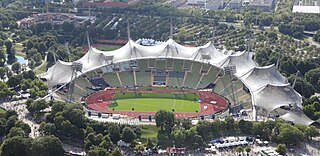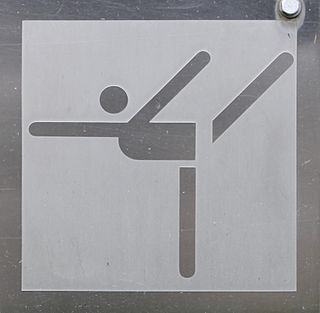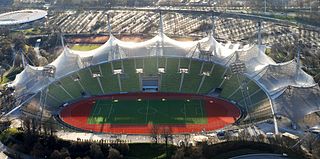
Munich is the capital and most populous city of the Free State of Bavaria, Germany. With a population of 1,594,632 inhabitants as of 31 May 2024, it is the third-largest city in Germany, after Berlin and Hamburg, and thus the largest which does not constitute its own state, as well as the 11th-largest city in the European Union. The city's metropolitan region is home to about 6.2 million people and the third largest metropolitan region by GDP in the European Union.

The Munich massacre was a terrorist attack carried out during the 1972 Summer Olympics in Munich, West Germany, by eight members of the Palestinian militant organization Black September. The militants infiltrated the Olympic Village, killed two members of the Israeli Olympic team, and took nine others hostage, who were later killed after a failed rescue attempt.

The Summer Olympic Games, also known as the Games of the Olympiad, is a major international multi-sport event normally held once every four years. The inaugural Games took place in 1896 in Athens, Greece, and the most recent Games are being held in 2024 in Paris, France. This was the first international multi-sport event of its kind, organized by the International Olympic Committee (IOC) founded by Pierre de Coubertin. The tradition of awarding medals began in 1904; in each Olympic event, gold medals are awarded for first place, silver medals for second place, and bronze medals for third place. The Winter Olympic Games were created out of the success of the Summer Olympic Games, which are regarded as the largest and most prestigious multi-sport international event in the world.

The 1980 Summer Olympics, officially known as the Games of the XXII Olympiad and officially branded as Moscow 1980, were an international multi-sport event held from 19 July to 3 August 1980 in Moscow, Soviet Union, in present-day Russia. The games were the first to be staged in an Eastern Bloc country, as well as the first Olympic Games and only Summer Olympics to be held in a Slavic language-speaking country. They were also the only Summer Olympic Games to be held in a self-proclaimed communist country until the 2008 Summer Olympics held in China. These were the final Olympic Games under the IOC Presidency of Michael Morris, 3rd Baron Killanin before he was succeeded by Juan Antonio Samaranch, a Spaniard, shortly afterwards.

The 1972 Summer Olympics, officially known as the Games of the XX Olympiad and officially branded as Munich 1972, were an international multi-sport event held in Munich, West Germany, from 26 August to 11 September 1972.

Olympiastadion is a stadium located in Munich, Germany. Situated at the heart of the Olympiapark München in northern Munich, the stadium was built as the main venue for the 1972 Summer Olympics.

The European Athletics Championships is a biennial athletics event organised by the European Athletic Association and is recognised as the elite continental outdoor athletics championships for Europe.

At the 1972 Summer Olympics, fourteen different artistic gymnastics events were contested, eight for men and six for women. All events were held at the Sports Hall in Munich from 27 August through 1 September.

The Bavarian International Tennis Championships is a men's tennis tournament held at the MTTC Iphitos in Munich, Germany. Founded in 1899 as a combined men's and women's event. and also known as the Bavarian Open. The tournament is played on outdoor clay courts and is a part of the ATP Tour schedule.

Oktoberfest is the world's largest Volksfest, featuring a beer festival and a travelling carnival, and is held annually in Munich, Bavaria, from mid- or late-September to the first Sunday in October, with more than six million international and national visitors attending the event. Locally, it is called d'Wiesn, after the colloquial name for the fairgrounds, Theresienwiese. Oktoberfest is an important part of Bavarian culture, having been held since the year 1810. Other cities across the world also hold Oktoberfest celebrations that are modeled after the original Munich event.
At the 1972 Summer Olympics in Munich, seven events in sprint canoe racing were contested, and for the first time at the Olympic Games, four events in slalom canoeing were also contested, at the Augsburg Eiskanal.

Sailing/Yachting is an Olympic sport starting from the Games of the 1st Olympiad. With the exception of 1904 and the canceled 1916 Summer Olympics, sailing has always been included on the Olympic schedule. The Sailing program of 1972 consisted of a total of six sailing classes (disciplines). For each class seven races were scheduled from 29 August 1972 to 8 September 1972 of the coast of Kiel-Schilksee in the Bay of Kiel. Kiel hosted the Olympic sailing competitions for the second time, having previously done so during the 1936 Summer Olympics. The sailing was done on the triangular type Olympic courses.

The 2007 Spar European Cup took place on 23 and 24 June 2007 at the Olympic Stadium in Munich, Germany. This was the 27th time the European Cup has been held and the second time the event has been hosted in Munich. It was the penultimate staging of the Cup.

The men's horizontal bar competition was one of eight events for male competitors in artistic gymnastics at the 1972 Summer Olympics in Munich. The qualification and final rounds took place on August 27, 29 and September 1 at the Olympiahalle. There were 113 competitors from 26 nations; nations entering the team event had 6 gymnasts while other nations could have up to 3 gymnasts. Japan reached the height of its success in the event this year, thoroughly dominating the event by taking the top five places. Mitsuo Tsukahara was the winner, with Sawao Kato second and Shigeru Kasamatsu third. Japan had now won the event in four of the last five Games. The only finalist from outside Japan was Nikolai Andrianov of the Soviet Union.

The men's long jump event at the 1972 Summer Olympics in Munich was held on 8 & 9 of September. Thirty-six athletes from 25 nations competed. The maximum number of athletes per nation had been set at 3 since the 1930 Olympic Congress. The event was won by 6cm by Randy Williams of the United States, the nation's second consecutive and 15th overall gold medal in the men's long jump. Hans Baumgartner earned West Germany's first medal in the event.

The men's triple jump event at the 1972 Summer Olympics in Munich was held on 3 & 4 of September. Thirty-six athletes from 28 nations competed. The maximum number of athletes per nation had been set at 3 since the 1930 Olympic Congress. The event was won by Viktor Saneyev of the Soviet Union, the fourth man to repeat as Olympic champion in the triple jump. The Soviets were on the podium in the event for the sixth consecutive Games. Jörg Drehmel of East Germany won the first men's triple jump medal by any German jumper. Nelson Prudêncio of Brazil was the ninth man to win a second medal in the event, following up his 1968 silver with bronze in Munich.

The men's coxed four competition at the 1972 Summer Olympics in Munich took place from 27 August to 2 September at the Olympic Reggatta Course in Oberschleißheim. There were 14 boats from 14 nations, with each nation limited to a single boat in the event. The event was won by West Germany; it was the nation's first medal as a separate team, but the third time in four Games that a West German crew had won gold. East Germany repeated as silver medallists, though with a new crew. Bronze went to Czechoslovakia, the nation's first medal in the men's coxed four since 1952.

The men's eight competition at the 1972 Summer Olympics in Munich took place from 27 August to 2 September at the Olympic Reggatta Course in Oberschleißheim. There were 15 boats from 15 nations, with each nation limited to a single boat in the event. The event was won by New Zealand, the nation's first medal in the men's eight. Silver went to the United States. East Germany also earned its first medal in the event, with bronze.
The 1997 European Cup was the 18th edition of the European Cup of athletics.

The Six Days of Berlin is a six-day track cycling race held annually in Berlin, Germany. The event was first held in 1909. In its first edition, 15 teams of two cyclists each competed in the exhibition hall at Berlin Zoo for glory and, not least, 5000 Goldmarks. Klaus Bugdahl holds the record of victories with nine.















